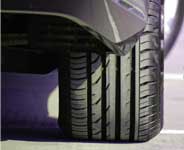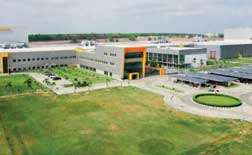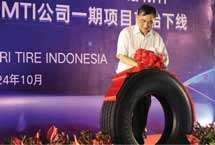Amid environmental issues over rising carbon emissions, the rubber/tyre sector is stepping up speed, fully committing to sustainability and making bold moves to ensure it achieves this goal, adds Angelica Buan in this article.
Market in a high gear
The global tyre industry is on track for significant growth, with projections showing its value rising from around US$164.9 billion in 2023 to approximately US$256.8 billion by 2032. This represents a CAGR of 4.9% during the forecast period, according to Imarc Group’s tyre market projection for 2032. Similarly, Precedence Research’s recent analysis anticipates growth for the automotive tyre market from nearly US$144 billion in 2024 to over US$232 billion by 2034, suggesting steady growth.
Likewise, Smithers projects the market’s value will rise fuelled by sectors like motorcycles and high-performance vehicles
Despite these optimistic figures, the sector faces road bumps, such as supply chain disruptions, rising raw material costs, and a strict regulatory environment, catalysing the adoption of innovative technologies and sustainable practices to secure the industry’s future.
Asia steering tyre market growth/recycling
Asia, a market front-runner and home to several global tyre majors, is seeing significant market growth. For example, Precedence Research reports that the Asia-Pacific tyre market is expected to reach US$95.3 billion by 2034, up from an estimated US$56.2 billion in 2023, growing at a CAGR of 5% from 2024-2034. This growth is driven by factors like rising disposable income, urbanisation, and increased demand for passenger vehicles.
However, the growing consumption of tyres brings with it an alarming increase in end-of-life tyres (ELTs), with around 1 billion tyres disposed of globally each year. Recycling tyres, as a primary method of disposal, is challenging due to their complex mix of rubber, steel, and synthetic fibres, which complicates efficient separation and processing. Without proper management, ELTs can lead to environmental and health hazards, such as harmful chemical runoff contaminating soil and water.
As such, the Asia-Pacific (APAC) region leads in tyre recycling, driven by its vast automotive industry and tightening environmental regulations, among other factors, according to a report by MarketsandMarkets.
Major vehicle producers/consumers like China, India, Japan, and South Korea generate an immense volume of ELTs yearly and with several APAC countries introducing stricter environmental laws and Extended Producer Responsibility (EPR) regulations, tyre manufacturers are driving greater investment in sustainable recycling initiatives.
Investments, expansions in the fast lane
Asia’s tyre sector is seeing a boost in investments and expansions, with manufacturers increasing production and capacity, and new plants opening to meet rising demand.
For example, German manufacturer Continental is investing EUR300 million to expand its tyre plant in Rayong, Thailand, increasing production capacity by an additional 3 million tyres/year. The expansion is backed by Thailand’s Board of Investment (BOI) as part of its Economic Recovery Scheme.
The Rayong plant, one of Continental’s largest production sites for motorcycle tyres, currently supplies both vehicle manufacturers and the replacement market, including specialised tyres for electric vehicles (EVs) and premium models like the MaxContact MC7. In 2023, the facility supplied OEM tyres for top EV manufacturers in the APAC region.
Continental says its Rayong plant uses advanced machinery and automated logistics systems, with a 6.7-MW capacity photovoltaic (PV) set-up, covering 13% of its annual electricity needs.
Similarly, expanding in Indonesia PT Matahari Tyre Indonesia (MTI), the new Indonesian subsidiary of China’s largest tyre manufacturer, Zhongce Rubber Group Co Ltd (ZC Rubber), has successfully produced its first all-steel radial tyre at its 500,000 sq m-factory located in Kendal Industrial Park, Semarang.
The production of MTI’s first all-steel radial tyre is just the beginning. With Phase II construction work already underway, ZC Rubber plans to boost production capacity.
On a similar growth track in India, where tyre demand is increasing, Bridgestone India Private Ltd, a subsidiary of Bridgestone Corporation, is investing US$85 million to expand its tyre production capacity at its operations at the Pune and Indore plants. By 2029, production at the Pune plant is expected to increase by 1.1 million tyres/year, while the Indore plant will focus on producing high-quality, premium tyres.
Additionally, a satellite technology centre will be built at the Pune plant in 2025 to develop products using Enliten technology, which uses proprietary lightweight materials to reduce rolling resistance, leading to lower fuel consumption, improved wear, and more durable tyres, says Bridgestone.
Meanwhile, Indian tyremaker Ceat has inaugurated a truck/bus radial (TBR) production line at its Chennai plant, with a capacity of 1,500 tyres/day. Located in Sriperumbudur across 160 acres, the plant is a key hub in Ceat’s global operations.
This expansion, which complements Ceat’s production of 20,000 passenger car radial (PCR) and 3,000 motorcycle radial (MCR/MCS) tyres/day, to meet the growing demands of both domestic and international markets, it adds.



